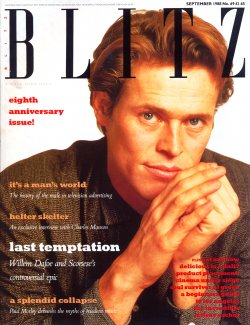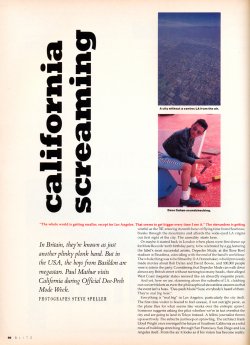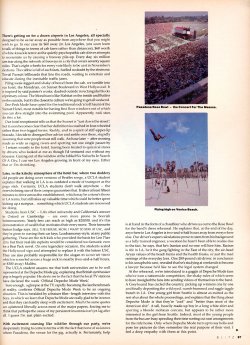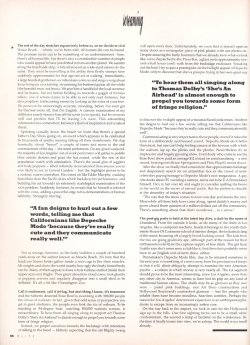California Screaming
[Blitz, September 1988. Words: Paul Mathur. Pictures: Steve Speller.]
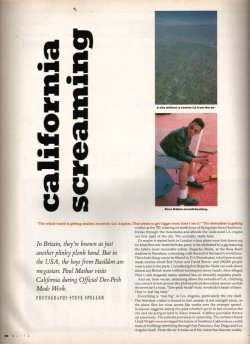
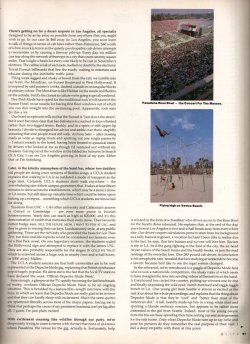
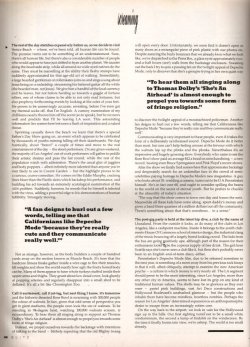
In Britain, they’re known as just another plinky plonk band. But in the USA, the boys from Basildon are megastars. Paul Mathur visits California during Official Dee-Pesh Mode Week.
“The whole world is getting smaller, except for Los Angeles. That seems to get bigger every time I see it.” The stewardess is getting wistful as the 747, entering its tenth hour of flying time from Heathrow, breaks through the mountains and affords the wide-eyed LA virgins our first sight of the city. The unreality starts here.
Or maybe it started back in London when plans were first drawn up for Mute Records’ tenth birthday party, to be celebrated by a gig featuring the label’s most successful artists, Depeche Mode, at the Rose Bowl stadium in Pasadena, coinciding with the end of the band’s world tour. The whole thing was to be filmed by D. A. Pennebaker, who’d previously made movies about Bob Dylan and David Bowie, and 100,000 people were to join in the party. [1] Considering that Depeche Mode can walk down almost any British street without turning too many heads, their alleged West Coast megastar status seemed like an absurdly exquisite prank.
And yet, here we are, skimming above the suburbs of LA, clutching our concert tickets even as the philosophical stewardess assures us that the event isn’t a hoax. “Dee-pesh Mode? Sure, everybody’s heard of them. They’re real big here.”
Everything is “real big” in Los Angeles, particularly the city itself. The first-time visitor is bound to feel unease, if not outright panic, as the plane flies for what seems like weeks over the entropic sprawl. Someone suggests asking the pilot whether we’ve in fact overshot the city and are going to land in Tokyo instead. A fellow journalist throws up assertively. The suburbs just keep on sprawling. The architect Frank Lloyd Wright once envisaged the future of Southern California as a solid mass of buildings stretching through San Francisco, San Diego and Los Angeles itself. From the air it looks as if his vision has become reality.
There’s getting on for a dozen airports in Los Angeles, all specially designed to be as far away as possible from anywhere that you might wish to go. In our case its $60 away (in Los Angeles, you soon learn to talk of things in terms of cab fares rather than distances), $60 worth of white-knuckle terror as the quietly psychopathic cab-driver attempts to reorientate us by causing a freeway pile-up. Every day, six million cars tear along the network of freeways in a city that covers seventy square miles. That’s eight wheels for every vote likely to be case in November’s elections. The cabbie is full of such facts, fuelled no doubt by the electronic Trivial Pursuit billboards that line the roads, waiting to entertain and educate during the inevitable traffic jams.
Piling weak-legged and shaky of bowel from the cab, we tumble into our hotel, the Mondrian, on Sunset Boulevard in West Hollywood. It is inspired by said painter’s works, daubed outside in rectangular blocks of primary colour. The Mondrian is like Habitat on the inside and Butlin’s on the outside, but it’s the closest to culture we’re going to get all weekend.
Dee-Pesh Mode have opted for the traditional rock’n’roll haunt of the Sunset Hotel, most notable for having first floor windows out of which you can dive straight into the swimming pool. Apparently, rock stars do this a lot.
Our hotel receptionist tells us that the Sunset is “just down the street”, but it soon becomes clear that her definition is couched in four-wheeled rather than two-legged terms. Rashly, and in a spirit of stiff-upper-lip bravado, I decide to disregard her advice and amble over there, stupidly assuming that some people must still walk. An hour later – after crossing roads as wide as raging rivers and spotting not one single passer-by – I return wearily to the hotel, having been treated to quizzical stares by drivers who looked at me as though I’d ventured out without my trousers. Gazing out of the window at the fabled Six Suburbs In Search Of A City, I can see Los Angeles growing in front of my eyes. Either that or I’m shrinking.
Later, in the kitschy atmosphere of the hotel bar, where two doddery old people are doing cover versions of Beatles songs, a UCLA student explains that walking in LA is as outdated a mode of transport as the pogo stick. Certainly, UCLA students don’t walk anywhere – the overwhelming size of their campus guarantees that. It takes at least fifteen minutes to drive across the establishment, which may be a stone’s throw in LA terms, but still takes up valuable time which could be better spent kicking up a rumpus… something which UCLA students are renowned for doing.
Students from USC – LA’s other university and California’s answer to Oxford or Cambridge – are even more prone to boorish boisterousness. Yearly fees can reach as high as $20,000, and it’s this demonstration of wealth that motivates their every move. Their favourite button badge says, SELL THE HOUSE, MOM, I WANT TO STAY AT USC, and they’re given to waving their car keys, Loadsamoney-style, at any public gathering. These are the rich kids who provided the basis for Less Than Zero, but their real-life exploits would be considered too fantastic even for a Brat Pack novel. On one legendary occasion, the students scaled the Hollywood sign and attempted to replace it with the letters USC. They are also probably responsible for the slogan IN GOLD WE TRUST which is scrawled across a huge rock in nearby (two-and-a-half hours, or $300 away) Malibu.
The UCLA student assures me that both universities are to be well represented at the Depeche Mode gig, explaining that British synthesiser pop is hugely popular. He alerts me to the fact that the local TV stations have declared the week “Official Depeche Mode Week”.
Sure enough, a glimpse at the TV, rapidly becoming the last benchmark of reality, confirms Official Depeche Mode Week to be an ongoing situation. This is heralded by a feature film-length interview with the boys, in which we learn that Depeche Mode are really glad to be in town and that they can hardly sleep with excitement. Much the same quotes are splattered liberally across most of the major papers, forcing me to think that perhaps the cause of my persistent insomnia isn’t jet-lag after all. I guess I’m just plain excited.
With excitement coursing like wildfire through our party, we’re desperately trying to come to terms with the fact that none of us knows where Pasadena, the venue for the gig, actually is. Fortunately, help is at hand in the form of a chauffeur who drives us out to the Rose Bowl for the band’s dress rehearsal. He explains that, at the end of the day, anywhere in Los Angeles is two-and-a-half hours away from anywhere else. Our driver’s expert calculations prove to stem from his background as a fully trained engineer, a vocation he hasn’t been able to realise due to the fact, he says, that he’s Iranian and no-one will hire him. Racism is rife in LA, be it the gang fighting in the East of the city, the air-head Aryan values of the beach bums and the health freaks, or just the mad rantings of the everyday Joes. One 280-pound cab driver, in conclusion to his xenophobic rant, revealed that he’s studying at weekends to become a lawyer because he’d like to see the legal system changed.
[Blitz, September 1988. Words: Paul Mathur. Pictures: Steve Speller.]
" Sure enough, a glimpse at the TV, rapidly becoming the last benchmark of reality, confirms Official Depeche Mode Week to be an ongoing situation. This is heralded by a feature film-length interview with the boys, in which we learn that Depeche Mode are really glad to be in town and that they can hardly sleep with excitement. "
...The screaming being the reader realising the article isn't as much about Depeche Mode as they hoped. A sort of background reader on the Rose Bowl show: the show itself passes in a haze, and while this article creates a good sense of atmosphere and build-up, an excessively long "scene-setter", which boils down to "Isn't LA big?" repeated in various forms, mars the piece.



In Britain, they’re known as just another plinky plonk band. But in the USA, the boys from Basildon are megastars. Paul Mathur visits California during Official Dee-Pesh Mode Week.
“The whole world is getting smaller, except for Los Angeles. That seems to get bigger every time I see it.” The stewardess is getting wistful as the 747, entering its tenth hour of flying time from Heathrow, breaks through the mountains and affords the wide-eyed LA virgins our first sight of the city. The unreality starts here.
Or maybe it started back in London when plans were first drawn up for Mute Records’ tenth birthday party, to be celebrated by a gig featuring the label’s most successful artists, Depeche Mode, at the Rose Bowl stadium in Pasadena, coinciding with the end of the band’s world tour. The whole thing was to be filmed by D. A. Pennebaker, who’d previously made movies about Bob Dylan and David Bowie, and 100,000 people were to join in the party. [1] Considering that Depeche Mode can walk down almost any British street without turning too many heads, their alleged West Coast megastar status seemed like an absurdly exquisite prank.
And yet, here we are, skimming above the suburbs of LA, clutching our concert tickets even as the philosophical stewardess assures us that the event isn’t a hoax. “Dee-pesh Mode? Sure, everybody’s heard of them. They’re real big here.”
Everything is “real big” in Los Angeles, particularly the city itself. The first-time visitor is bound to feel unease, if not outright panic, as the plane flies for what seems like weeks over the entropic sprawl. Someone suggests asking the pilot whether we’ve in fact overshot the city and are going to land in Tokyo instead. A fellow journalist throws up assertively. The suburbs just keep on sprawling. The architect Frank Lloyd Wright once envisaged the future of Southern California as a solid mass of buildings stretching through San Francisco, San Diego and Los Angeles itself. From the air it looks as if his vision has become reality.
There’s getting on for a dozen airports in Los Angeles, all specially designed to be as far away as possible from anywhere that you might wish to go. In our case its $60 away (in Los Angeles, you soon learn to talk of things in terms of cab fares rather than distances), $60 worth of white-knuckle terror as the quietly psychopathic cab-driver attempts to reorientate us by causing a freeway pile-up. Every day, six million cars tear along the network of freeways in a city that covers seventy square miles. That’s eight wheels for every vote likely to be case in November’s elections. The cabbie is full of such facts, fuelled no doubt by the electronic Trivial Pursuit billboards that line the roads, waiting to entertain and educate during the inevitable traffic jams.
Piling weak-legged and shaky of bowel from the cab, we tumble into our hotel, the Mondrian, on Sunset Boulevard in West Hollywood. It is inspired by said painter’s works, daubed outside in rectangular blocks of primary colour. The Mondrian is like Habitat on the inside and Butlin’s on the outside, but it’s the closest to culture we’re going to get all weekend.
Dee-Pesh Mode have opted for the traditional rock’n’roll haunt of the Sunset Hotel, most notable for having first floor windows out of which you can dive straight into the swimming pool. Apparently, rock stars do this a lot.
Our hotel receptionist tells us that the Sunset is “just down the street”, but it soon becomes clear that her definition is couched in four-wheeled rather than two-legged terms. Rashly, and in a spirit of stiff-upper-lip bravado, I decide to disregard her advice and amble over there, stupidly assuming that some people must still walk. An hour later – after crossing roads as wide as raging rivers and spotting not one single passer-by – I return wearily to the hotel, having been treated to quizzical stares by drivers who looked at me as though I’d ventured out without my trousers. Gazing out of the window at the fabled Six Suburbs In Search Of A City, I can see Los Angeles growing in front of my eyes. Either that or I’m shrinking.
Later, in the kitschy atmosphere of the hotel bar, where two doddery old people are doing cover versions of Beatles songs, a UCLA student explains that walking in LA is as outdated a mode of transport as the pogo stick. Certainly, UCLA students don’t walk anywhere – the overwhelming size of their campus guarantees that. It takes at least fifteen minutes to drive across the establishment, which may be a stone’s throw in LA terms, but still takes up valuable time which could be better spent kicking up a rumpus… something which UCLA students are renowned for doing.
Students from USC – LA’s other university and California’s answer to Oxford or Cambridge – are even more prone to boorish boisterousness. Yearly fees can reach as high as $20,000, and it’s this demonstration of wealth that motivates their every move. Their favourite button badge says, SELL THE HOUSE, MOM, I WANT TO STAY AT USC, and they’re given to waving their car keys, Loadsamoney-style, at any public gathering. These are the rich kids who provided the basis for Less Than Zero, but their real-life exploits would be considered too fantastic even for a Brat Pack novel. On one legendary occasion, the students scaled the Hollywood sign and attempted to replace it with the letters USC. They are also probably responsible for the slogan IN GOLD WE TRUST which is scrawled across a huge rock in nearby (two-and-a-half hours, or $300 away) Malibu.
The UCLA student assures me that both universities are to be well represented at the Depeche Mode gig, explaining that British synthesiser pop is hugely popular. He alerts me to the fact that the local TV stations have declared the week “Official Depeche Mode Week”.
Sure enough, a glimpse at the TV, rapidly becoming the last benchmark of reality, confirms Official Depeche Mode Week to be an ongoing situation. This is heralded by a feature film-length interview with the boys, in which we learn that Depeche Mode are really glad to be in town and that they can hardly sleep with excitement. Much the same quotes are splattered liberally across most of the major papers, forcing me to think that perhaps the cause of my persistent insomnia isn’t jet-lag after all. I guess I’m just plain excited.
With excitement coursing like wildfire through our party, we’re desperately trying to come to terms with the fact that none of us knows where Pasadena, the venue for the gig, actually is. Fortunately, help is at hand in the form of a chauffeur who drives us out to the Rose Bowl for the band’s dress rehearsal. He explains that, at the end of the day, anywhere in Los Angeles is two-and-a-half hours away from anywhere else. Our driver’s expert calculations prove to stem from his background as a fully trained engineer, a vocation he hasn’t been able to realise due to the fact, he says, that he’s Iranian and no-one will hire him. Racism is rife in LA, be it the gang fighting in the East of the city, the air-head Aryan values of the beach bums and the health freaks, or just the mad rantings of the everyday Joes. One 280-pound cab driver, in conclusion to his xenophobic rant, revealed that he’s studying at weekends to become a lawyer because he’d like to see the legal system changed.
[1] - This is a massive overestimate - the actual figure for the Rose Bowl attendance has been put variously a couple of thousand either way of 70,000.

